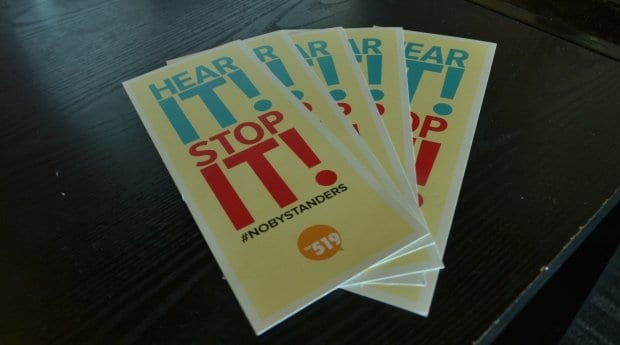At the One King West Hotel in downtown Toronto, the change room where the female room attendants get dressed can sometimes become an unintentionally uncomfortable place for LGBT staff members.
“My co-workers joke that maybe [I] need to go to another room,” Josh Cuasay says. Cuasay, who has worked at the hotel for nine years and uses no pronouns, is an out member of the LGBT community.
Cuasay doesn’t believe the comments are made maliciously but says they sting all the same. “I get it, but sometimes it should be not said.”
Stories like Cuasay’s are the motivation behind a new campaign from the 519 Church Street Community Centre aimed at creating more welcoming workplaces for LGBT people. The Hear It! Stop It! program asks people to cut words like “tranny” and “dyke” from their vocabulary.
The problem isn’t necessarily that workers are maliciously attacking their LGBT co-workers, says Steven Little, manager of education and training at The 519. The problem, he says, is that people may use words like gay in a derogatory way or use slang that, while culturally acceptable in their homes, makes LGBT co-workers uncomfortable.
This can be especially hard for new arrivals to Canada, who have come to escape discrimination in their home countries, Little says. “They’ve come to Canada believing that this is a country where there will not be that prejudice. The reality is somewhat different from that dream.”
Lisa Gore Duplessis, director of newcomer settlement services at The 519, says her clients find that safe spaces in Canada are limited to certain areas, like the gay villages, while their workplaces and cultural communities are still rife with the discrimination they experienced at home. As a result, many return to the closet out of fear, she says.
A recent survey done by Sodexo, a multinational food service and facilities management corporation, backs up the anecdotal findings of casual discrimination against LGBT employees. Sodexo found that more than 80 percent of LGBT respondents think businesses need to work harder to create a welcoming atmosphere for their employees.
Little points out that these numbers don’t include members of the LGBT community who have difficulty finding employment because of their gender expression or sexuality.
Rolled out initially in hotels across Toronto, where organizers hoped they could target workers who might interact with LGBT guests in town for WorldPride, the Hear It! Stop It! campaign offers anti-homophobia and -transphobia training for employees, as well as literature that asks people to think about the language they use in the workplace and at home.
Cuasay, a chief shop steward for Unite Here Local 75, which represents workers at the One King West Hotel, is happy with how the program has rolled out so far. If workers begin to relate their colleagues’ struggles to their own lives, it could help them empathize with the effect discriminatory language has on some LGBT people, Cuasay says.
However, the program, while generally well received by both employees and management, is not mandatory, Cuasay says. It also takes place outside regular work hours, which means that workers who have after-work commitments may not be able to participate.
Still, organizers have high hopes that they can start extending Hear It! Stop It! to more workplaces. The result, Cuasay hopes, will be that all people can live more openly and contribute more to the city.


 Why you can trust Xtra
Why you can trust Xtra


